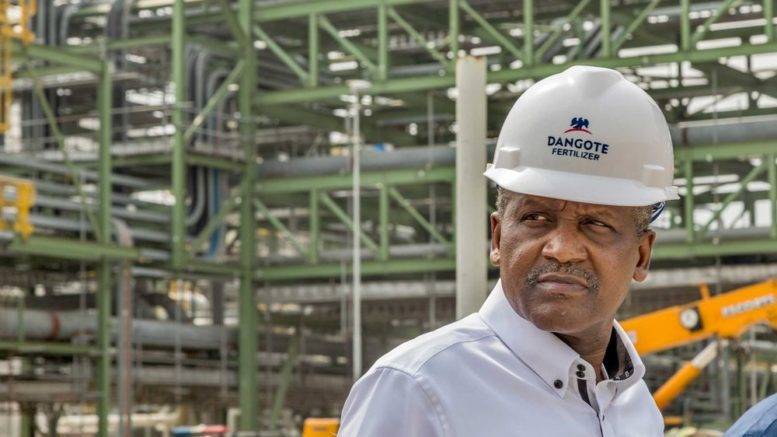Dangote’s Robust Refinery Project Is Being Stalled By Logistics But He’s Got A Plan-B

Due to problems importing steel and other equipment, Africa’s largest oil refinery — earlier scheduled for an opening in 2019 — will not be completed until the end of 2020.
Because of that, the Dangote refinery is to use tank farms this year as a warm-up before full operations.
The Dangote Refinery, talked up as the largest oil refinery of its kind in the world, will not start full operations until late 2020. Dangote says the crude unit which left China a few days ago is expected to arrive in Nigeria by the end of October.
The Dangote refinery tank farms in Lagos may be completed this year and used as the resumption of full-scale operations is awaited.
Dangote refinery’s Chief Operations Officer, Giuseppe Surace, made this known in an interview with Reuters.
According to the report, Surace revealed that the tanks will be connected to five “single point mooring buoys” (SPMs), which will allow the refinery complex to pump crude straight into tanks from large ships at sea and pump products back out onto boats of any size. “The SPMs will be the primary method of supplying oil products from the refinery,” the report added.
The refinery CEO said the team might consider using the tanks as training or as a depot before the refinery’s production starts.
Nigeria, Africa’s most populous nation, imports virtually all its fuel due to sclerotic and underutilised refineries, and even the state oil company is keeping faith with the 650,000 barrel per day (BPD) Dangote refinery to help address this.
Price caps force NNPC to import nearly all its gasoline at a significant cost and periodic fuel shortages are known to happen more often than not.
Due to delays at the congested Apapa and Tin Can Island Ports in Lagos, the Dangote executive said the company could start using the refinery’s tank farms as a depot to warm-up operations.
“We will be able to complete the (refinery) project by the end of next year – mechanical completion,” said Dangote Group Executive Director, Devakumar Edwin, who oversees the project.
The company expects fuel production within two months of completion of the refinery, which could transform Africa’s biggest crude producer from a fuel importer into a net exporter, upending global trade patterns.
Billionaire Aliko Dangote, who built his fortune on cement, first announced a smaller refinery in 2013, to be finished in 2016. Dangote then moved the site to Lekki, in Lagos, upgraded the size and said production would start in early 2020, though people familiar with the workings of the industry are rooting for 2022 as a more likely launch date.
The Dangote refinery team is also having discussions with the NNPC, as well as two other international oil companies and two large oil traders, all of whom have interests in supplying crude and buying petroleum products.
The crude unit for the refinery, which set sail from China last month, would arrive by the end of October, and according to company executives, the trains at a fertilizer plant on the same site will start up by the end of 2019.
On the whole, the Dangote refinery project comes with lofty ambitions, including a daily production capacity of 600,000 barrels per day and the generate 9,500 direct and 25,000 indirect jobs for Nigerians and foreign expats.
Featured Image Courtesy: investorsking.com